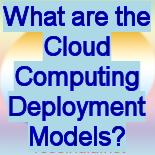Adapting to cloud is the newest trend across enterprises and large to small business processes for decreasing operational costs and chunks of investments on IT infrastructure. Cloud is one of the fastest growing area that present day computing has to offer to the business world. Cloud computing deployment models that we are going to discuss here would provide some fresh insights into this huge growth and corresponding hype that cloud environment received in the recent time. And why only business, the experience of personal computing and entertainment through computing devices has never been so engaging and intuitive before cloud. From on the go business applications and communication to social networking to real time conferencing or chat to gaming and entertainment on personal devices, Cloud computing in many ways changed the way we used to save our data and use them. Let us now have a look at the four cloud computing deployment models that would help us to understand how cloud works on various platforms.
Public Cloud
Among the four cloud computing deployment models Public Cloud presumably hold the key position for large scale cloud offerings from a resource pool that are shared by all users on a public network. The cloud provider in this category can target great economy of scale by optimizing service, maintenance and performance that for the end user is bound to produce superior cost advantages. Optimizing the resources is the key element or concerning area in Public Cloud environments.
Private Cloud
A Cloud computing environment designated and dedicated to a single organization is called Private Cloud. Private cloud in comparison to all other cloud computing deployment models is more popular and specific to business organizations. Unlike server based computing models the resources of this computing environment would let the users access the data from anywhere and from a wide array of devices while not compromising on security point of view as in a public cloud environment. Typically Private Cloud resources can be managed by the organization's own infrastructure on site basis or on off site by third party vendor organization assigned for providing and maintaining the same. Private Cloud among the large scale business organizations are increasingly becoming popular and slowly replacing the server based computing model for reducing operational and infrastructure costs to a great extent.
Community Cloud
Community Cloud shares similarities with both the cloud computing deployment models discussed above, namely, Public Cloud and Private Cloud. Like in Public Cloud the data storage, software application and cloud resources can be accessed and used by multiple organizations and vast pool of people from different user specific backgrounds, but the maintenance and operational processes are governed, performed and determined by a community of organizations who belong to same mutual business interest and who know each other like the members of a closely knit community of people. Security agencies and companies that are dependent on sharing of information on a common business goal are best suited user of this deployment model.
Hybrid Cloud
Hybrid Cloud is the deployment model that shares all the attributes of the previously discussed cloud computing deployment models. Hybrid Cloud typically applies a mixture of both Private Cloud and Public Cloud and is mostly adapted by large business organizations who already went under the process of data storage of Public Cloud network while maintaining internal sharing of information through a Private Cloud environment. While relying on Public Cloud for storage of less sensitive information, simultaneously for internal operational access of information you can maintain a Private Cloud while at the same time you can subscribe to a Community Cloud for compliance or legal issues. Thus this typical deployment model allows a business organization to reap the benefits of all types of cloud environment in different deployment models.
